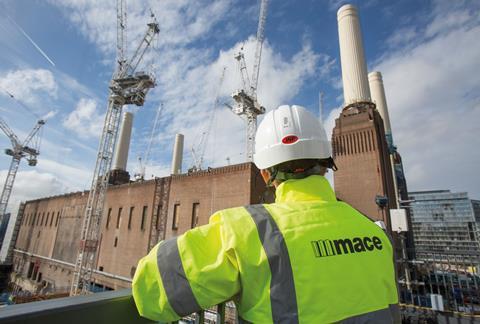Chief executive Mark Reynolds says turnover will dip ŌĆśquite a bitŌĆÖ this year
Mace has confirmed that it has broken the ┬Ż2bn turnover barrier for the first time but reveals profit slipped during 2018.
In the year ended 31 December the firm turned over ┬Ż2.35bn, an increase of 19% on its 2017 figure, while pre-tax profit came in at ┬Ż32.8m ŌĆō down 8% year-on-year, and resulting in a pre-tax margin of 1.4%.
In its annual report Mace also revealed chief finance officer Dennis Hone will retire at the end of the year.

Mark Reynolds, chief executive of Mace, told ║├╔½Ž╚╔·TV it had been a ŌĆ£good yearŌĆØ despite ŌĆ£challenges on a couple of projectsŌĆØ.
But he revealed that the group would see its revenue dip ŌĆ£quite a bitŌĆØ below ┬Ż2bn in 2019, having broken through the ┬Ż2bn barrier for the first time last year.
Reynolds told ║├╔½Ž╚╔·TV: ŌĆ£There was a bit of a spike in our last year from our international business and datacentre contracts. It was a bumper year. This year [2019] will be less. ThereŌĆÖll be a drop in turnover in London and the South East.ŌĆØ
ŌĆ£Like many others, [if] you have a problem on a project and you have to write down profit itŌĆÖs the 1% of projects that hurt you. This year coming construction will do very well. IŌĆÖm not worried about turnover, itŌĆÖs about profit. Our margin will go up significantly.ŌĆØ
This year will be the last for current chief financial officer Hone, who joined the contractor in 2014. He was previously chief executive of the London Legacy Development Corporation, and before that as head of the Olympic Delivery Authority.
He is set to be replaced by Richard Bienfait, who was made chief executive of higher education developer University Parternships Programme in January this year. He was previously chief financial officer at the group.
Bienfait will join Mace in the likely aftermath of the UKŌĆÖs exit from the European Union, with Reynolds saying he was concerned by clients being more selective about work as a result.
ŌĆ£TheyŌĆÖre all more cautious with the Brexit effect. Brexit for us is a short-term hit in the first instance,ŌĆØ he said. ŌĆ£The movement of goods is the biggest risk. It can hit you on projects, with higher prelims, and delays and potentially damages.ŌĆØ
Reynolds also warned against over-borrowing in the contracting business. ŌĆ£ItŌĆÖs all about cash balances and cash resilience. If you have to borrow money to fund your operational business then thatŌĆÖs dangerous.
ŌĆ£Well-run companies donŌĆÖt have these sorts of problems. The example is Carillion. If you pay out more than you earn over a long period, then youŌĆÖre going to end up in a bad place.ŌĆØ



























No comments yet